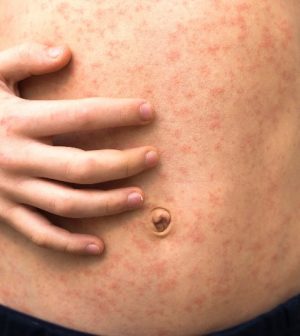- Could Your Grocery Store Meat Be Causing Recurring UTIs?
- Are You Making This Expensive Thermostat Error This Winter?
- Recognizing the Signs of Hypothyroidism
- 10 Strategies to Overcome Insomnia
- Could Artificial Sweeteners Be Aging the Brain Faster?
- Techniques for Soothing Your Nervous System
- Does the Water in Your House Smell Funny? Here’s Why
- Can a Daily Dose of Apple Cider Vinegar Actually Aid Weight Loss?
- 6 Health Beverages That Can Actually Spike Your Blood Sugar
- Treatment Options for Social Anxiety Disorder
Vaccines Protect You & Your Kids From Measles: FDA

As new outbreaks of measles — a once nearly eliminated illness in the United States — continue to emerge, experts remind Americans that there’s an easy way to stop infection: Get vaccinated.
“Measles spreads so easily that if one person has it, 90% of the people close to that person who are not vaccinated or otherwise immune will also become infected,” the U.S. Food and Drug Administration warned in a statement released Friday.
Measles is spread through the air. It “starts with a fever, cough, runny nose, red eyes and sore throat,” the FDA said. “Soon after, a rash of tiny, red spots breaks out.” The rash begins at the head and spreads to the rest of the body.
FDA-approved vaccines can prevent infection, however, and are safe and highly effective.
Their track record is stellar: In 1963, before the launch of widespread measles immunization programs, up to 4 million Americans were sickened by the illness annually, the FDA said.
“Of those, 400 to 500 people died, 48,000 were hospitalized and 1,000 developed encephalitis [swelling of the brain] because of measles yearly,” the agency noted.
Vaccination has turned that around, leading to a 99% decline in cases since immunization programs began.
Still, misinformation abounds and some parents may still balk at getting their kids the shot. Higher levels of unvaccinated people are a big factor behind outbreaks in communities.
So far, the FDA has approved two measles vaccines: MMR II and Priorix, for use in people ages 12 months and older. Kids ages 1 to 12 may also get the MMRV (measles, mumps and rubella and varicella) or ProQuad vaccine, which also shields kids from chickenpox.
Current recommendations from the U.S. Centers for Disease Control and Prevention advise that children get two doses of the MMR vaccine, starting with the first dose at age 12 through 15 months, with the second dose coming at ages 4 to 6. The same schedule holds true for kids who get the ProQuad shot.
As with any vaccine, side effects can occur. However, with all measles vaccines they are mild (fever and/or rash) and transient, the FDA said. The vaccine contains a small amount of weakened virus to prime your immune system should you become exposed.
“Before each vaccine’s approval, data from animal studies and from clinical trials in humans were evaluated by FDA scientists and doctors,” the agency said.
Some rumors have suggested that the MMR vaccine is connected to autism; that is simply not true.
“Several organizations in addition to the CDC — including the World Health Organization, the Institute of Medicine [now known as the National Academy of Medicine] and the American Academy of Pediatrics — have conducted multiple studies,” the FDA noted. “All those studies failed to show a causal relationship between vaccines and autism.”
So, be sure to get your child vaccinated against measles. Doing so not only protects your child and your family, it can also protect folks who cannot be vaccinated. According to the FDA, these include infants under 6 months of age and people with compromised immune systems, such as cancer patients.
More information
Find out more about the measles vaccine at the CDC.
SOURCE: U.S. Food and Drug Administration, statement, March 1, 2024
Source: HealthDay
Copyright © 2026 HealthDay. All rights reserved.










